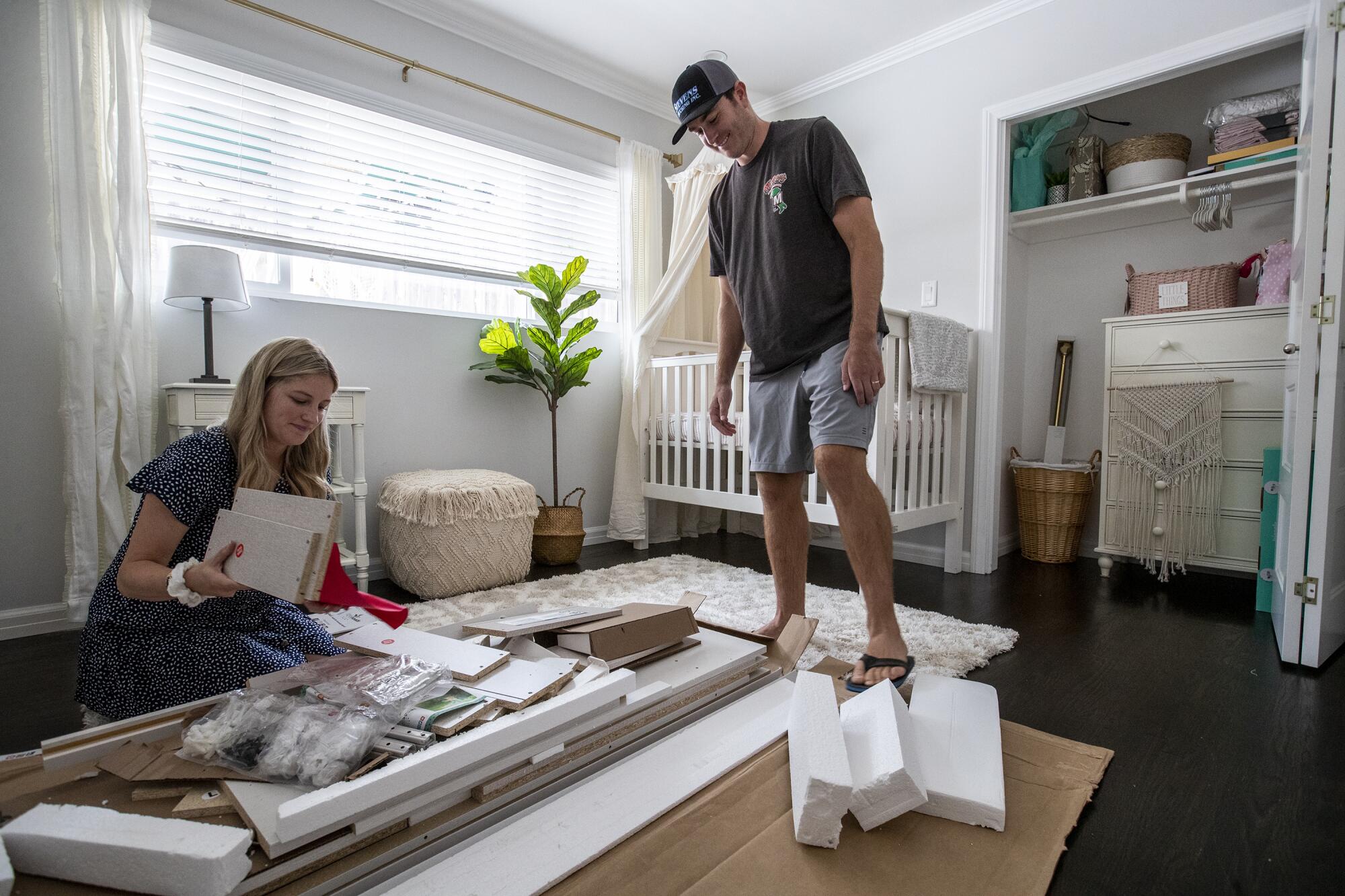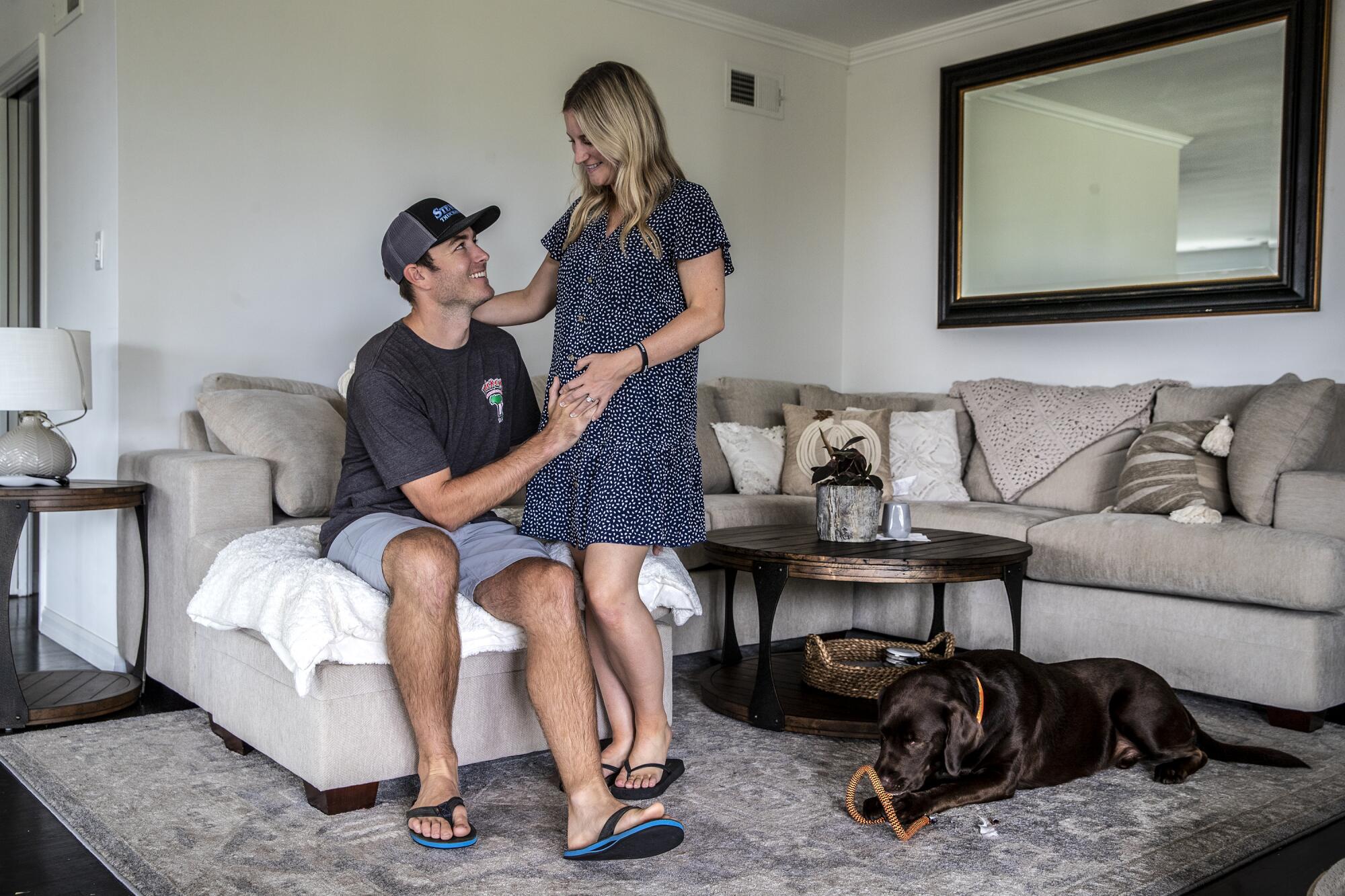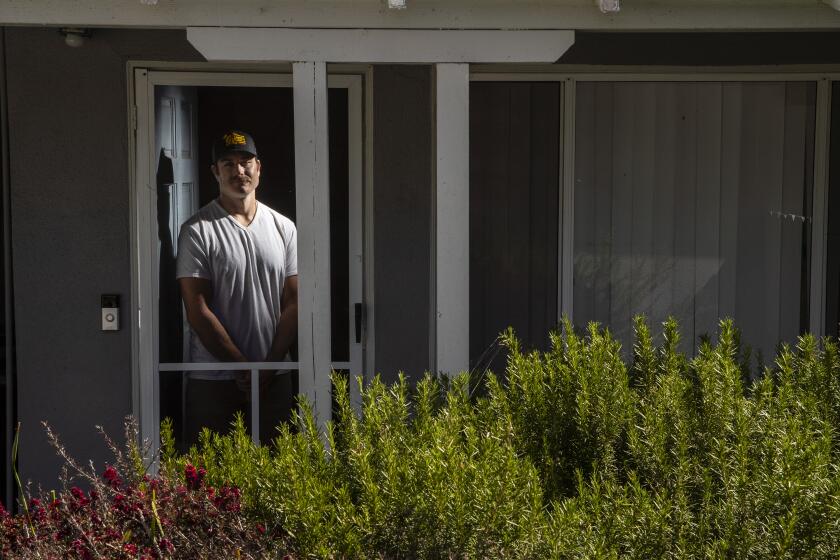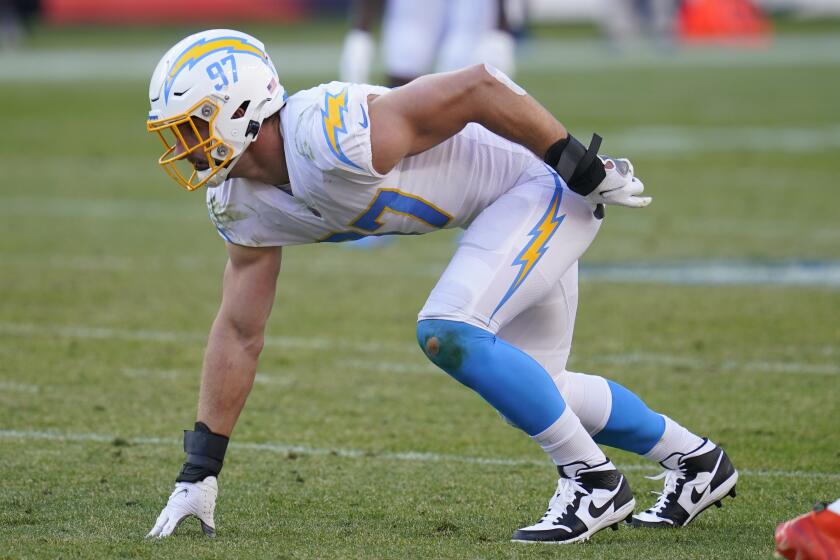
- Share via
This is the second in a series of stories chronicling Eric and Amanda Stevens’ journey as Eric fights ALS.
::
Inside the unassuming home a few blocks from the beach in San Pedro, the nursery is almost finished.
A white crib has been assembled. There’s a changing table, dresser and bassinet. The closet is filled with gifted onesies for the baby girl due in early January. A rocking chair is on the way.
Each day brings Eric and Amanda Stevens closer to meeting their daughter, but also pushes them toward a harsh reality.
“One year ago, I didn’t know how I could go on another day,” Amanda wrote this summer on Facebook. “I felt broken devastated, depressed and defeated. I was told that the one person I was supposed to spend the rest of the my life with was only going to live a couple more years.”
This is the daily struggle since Aug. 27, 2019, when Eric was diagnosed with amyotrophic lateral sclerosis, better known as Lou Gehrig’s disease. The couple, who had been married only a month, had just returned from honeymooning in Montana to their dream jobs. Amanda taught second grade in Costa Mesa. Eric, who captained the UC Berkeley football team and played for the St. Louis Rams, was a firefighter with the Los Angeles Fire Department.
Eric Stevens was relentless as a Cal football player. He battles ALS with the same approach.
Unsettling symptoms had been nagging Eric. His left hand felt weak. Muscles spasmed. He sometimes slurred words. He suspected ALS. When a neurologist confirmed his fears, Eric almost passed out.
“We’ve always planned our future to have kids, have a family,” he said. “There was a moment there for a few months where we didn’t think it was going to happen because of my diagnosis.”
Recalling that time, Eric’s words are heavy and halting, another reminder of the disease’s relentless advance. He can still breathe and swallow and walk without assistance. But lifting an arm can be difficult. His muscles seem to be twitching more.
Amanda is on leave from her teaching job to help Eric full time. She keeps the couple focused on what they can control. That means Eric, 31, downs more than 20 supplements and vitamins each day. He keeps a strict diet built around meat, fish and green, leafy vegetables. Takes IVs with glutathione, Vitamin B12, Vitamin C. There’s stretching with resistance bands. Lifting light weights. Physical therapy. Massages. Sauna sessions.
As she prepares for motherhood, Amanda also fights to stay positive. Nudges her husband out of bed each morning. Ties his shoes. Buttons his shorts. Clips his fingernails. And tries not to worry about the future.
It’s the person you love and you’d do everything you can for that person. That’s what I say to people. You’d do the exact same thing.
— Amanda Stevens
“A lot of people will say to me, ‘How are you so strong?’” Amanda said. “It’s like you don’t have a choice. It’s the person you love and you’d do everything you can for that person. That’s what I say to people. You’d do the exact same thing.”
::
The ball, kicked hard and at close range, smacked Amanda in the face as Cal played Pepperdine in the first round of the NCAA women’s soccer tournament in November 2012.
Eric watched as she crumpled to the ground. They were in the early stages of dating. He was a bruising fullback for Cal’s football team who would sooner run over opponents than run around them, but couldn’t fathom recovering from such a blow so quickly.
“She just popped right back up and kept playing like nothing had ever happened,” Eric said. “Man, that is one tough girl.”
Amanda proved it every day. As a Cal freshman, she suffered a torn medial collateral ligament and meniscus in her left knee on the third day of training camp. She redshirted that season but rebounded to play 45 games over three years, serve as a team captain, then spend a fifth year at St. Mary’s College in nearby Moraga, Calif., as a graduate transfer.
Nothing slowed her down. She played center defender — a position that usually goes to someone tall and powerful — despite standing just 5-2.
“I would try to show my coach that my size doesn’t matter,” Amanda said.
She used speed, competitiveness and strength that belied her slight figure to transform routine practices into ferocious, all-out efforts.
“She’s tenacious, feisty, but incredibly unassuming,” said Amanda Groves, a Cal teammate and close friend. “You look at her and she’s so sweet and kind and beautiful, then on the field she is such a bad ass.”
But there was more. Teammates looked up to her.
“You want to make her proud,” Groves said.
::
Those school days — their first date at the San Francisco Zoo not long after the ball to the face, the first time saying “I love you” while attending a monster truck rally on Jan. 8, 2013, the plans to build a family together — can now feel like distant memories.
On the day of his diagnosis, Eric posted a photo to Instagram from their wedding. They held hands and smiled at each other in a green field under a cloudless sky in San Luis Obispo.
“Wish I could go back in time. I love you more than anything,” Eric wrote.
The neurologist’s verdict seemed impossible. ALS afflicts roughly two out of every 100,000 people. Their average age is 55. The estimated life expectancy is two to five years. No approved treatment, no therapy, no list of instructions to manage the disease. Just three letters that sounded like a death sentence.
A couple of weeks after the appointment, they escaped to Mammoth with friends. Hikes, sunshine, Amanda preparing eggs and bagels for breakfast. Everything seemed normal.
“It was hard to realize what was happening because they had it so together,” said Molly Churlonis, one of the friends.
Eric and Amanda decided to go public to push for easier access to experimental treatments for ALS, even though it went against Eric’s private nature. He had once told Amanda he didn’t want a wedding because he didn’t want to be in the spotlight. He was used to being the one helping people, not the one asking for help. But what else could they do?
Amanda started filming Instagram updates on Eric’s condition as part of an effort around the #AxeALS hashtag that grew out of his firefighting career. It was one of dozens of ways she’s been pushed into new territory. She told Groves that she wasn’t an influencer, that she felt awkward talking to the camera. She didn’t want to speak for Eric but realized if she didn’t, his story wouldn’t be told.
Chargers’ Joey Bosa talks about his two weeks in concussion protocol. He has no recollection of the play that knocked him out of a game on Nov. 1.
“I’m not letting this be the end,” Amanda said. “I’m going to buy every single day until we can help him and get him better. ... We do have a chance here. Nothing is impossible. Let’s do everything we can to change this and to fight.”
::
The tears came in a torrent, accompanied by the kind of heart-wrenching sobs that make breathing difficult.
It was late in January this year, almost five months after the diagnosis. The next day, Amanda would deliver a speech at a performing arts center in Montana, and she was rehearsing in front of a half-dozen people.
Friends and family had marveled at her optimism, her poise, her concern for others in the midst of a life-altering crisis. But now emotion poured out.
Amanda worried the same thing would happen on stage, that the audience wouldn’t be able to understand her, that she wouldn’t able to tell her husband’s story, that she wouldn’t be able to speak up for the families of the estimated 16,000 people fighting ALS in the U.S.
Looking back, she doesn’t remember much from the speech. Everything seemed to fade to black.
“I want you to imagine being trapped in your own body,” Amanda told the audience in an even, composed voice, sounding as if she had delivered the talk dozens of times. “Imagine that you have something as simple as an itch on your head or your leg, but your arms and hands won’t move to scratch it and your mouth, it won’t speak to ask them to scratch it for you. So you sit there and you hope that the itch will pass.

“I want you to imagine waking up in the morning and not being able to get yourself out of bed, brush your own teeth, comb your own hair, put on your own clothes, go to the bathroom by yourself, feed or bathe yourself. Your body has completely shut down.”
Eric, whose illness hasn’t progressed to that grim stage, shook as he watched.
“Each day Eric wakes up and his left hand becomes a little bit weaker,” Amanda continued. “His twitching intensifies and spreads to other parts of his body like his legs, back, neck. His legs give out more frequently. And his speech, it slurs just a little bit more. Each day without treatment is a day lost.”
Her voice cracked.
The words were blunt, exasperated, pleading as she discussed the drawn-out process to test drugs to fight a disease first identified in 1869.
“At what point does the scientific method surpass human compassion, decency and common sense?” Amanda said. “While we wait for data, kids are dying. Brothers and sisters are dying. Mothers and fathers are dying. Cousins, aunts, uncles, grandparents are dying. My husband is dying.”
She concluded: “We will not stand down and we will not run. We fight for the will to live in the hope that the fight will change the course of our lives.”
With that, video shows Eric stepping up to embrace Amanda on stage. She seems to disappear into his arms.
“Just wave,” she says quietly to him as they turn to walk off. And he does.
Everything I thought I knew about her, when we were faced with adversity, it’s been proven to be true. She’s been an absolute warrior.
— Eric Stevens
::
On a morning in early May, Eric relaxed in a rocking chair on the porch of Amanda’s parents’ home outside of San Diego. It overlooked a grassy yard where the couple’s dog, Duke, romped and four chickens wandered.
Amanda bore an unusual smile and to Eric looked excited and a little nervous.
“What’s wrong?” he recalled asking.
She pulled a digital pregnancy test out of a pocket and showed him. “Pregnant,” it read.
They had discussed this day. Hoped for it. The eight and a half months fighting ALS appeared to shove it out of reach.
Tears, happy for once, streamed down both of their faces.
“It was the blessing they need,” their friend Churlonis said. “It made us all feel hopeful again.”
The couple surprised family members and friends with the news. Amanda’s sister, Emma, got a onesie with “Hello, Auntie” written on the front.
Groves got a similar surprise in the mail along with a copy of the ultrasound image.
Eric and Amanda beamed while posing for pregnancy photos holding a onesie: “Baby Stevens January 2021.” That would be about 16 months after they were told Eric had two to five years left.
The photos look like a couple who should be in the prime of life. The black #AxeALS bracelet on Amanda’s left wrist is a reminder of the other side of their pre-parenthood giddiness. The photos don’t show the disease gaining more ground each day, at what feels like an increasingly rapid pace.
While Amanda tracks their daughter’s growth with an app that compares her size to a fruit or vegetable each week — week 32 was a squash — Eric is shaking more. His fine motor skills are deteriorating. His right hand is weaker. That weakness is spreading through his arms and legs.
The couple continues to push for federal legislation to remove barriers between ALS patients and experimental treatments. Last month, a bipartisan group of U.S. senators and representatives introduced revised versions of the “Accelerating Access to Critical Therapies for ALS Act” in both houses. The legislation would trigger a grant program to fund access to investigational treatments for patients who aren’t enrolled in clinical trials.
“It’s mind blowing how optimistic she is,” Groves said. “No matter how many roadblocks they come up against, she continues to fight.”
Amanda manages her pregnancy and cares for Eric while transforming into an advocate who discusses the nuances of the drug trial process as authoritatively as she recites details of her husband’s month-by-month symptoms.

“Everything I thought I knew about her, when we were faced with adversity, it’s been proven to be true,” Eric said. “She’s been an absolute warrior.”
He’s looking forward to watching his wife become a mother.
Eric and Amanda have settled on a name for their daughter, though they’re keeping it to themselves.
They hope Eric will be able to hold her. Push her around the block in a stroller. Spend simple moments with her as time slips away.
More to Read
Go beyond the scoreboard
Get the latest on L.A.'s teams in the daily Sports Report newsletter.
You may occasionally receive promotional content from the Los Angeles Times.













